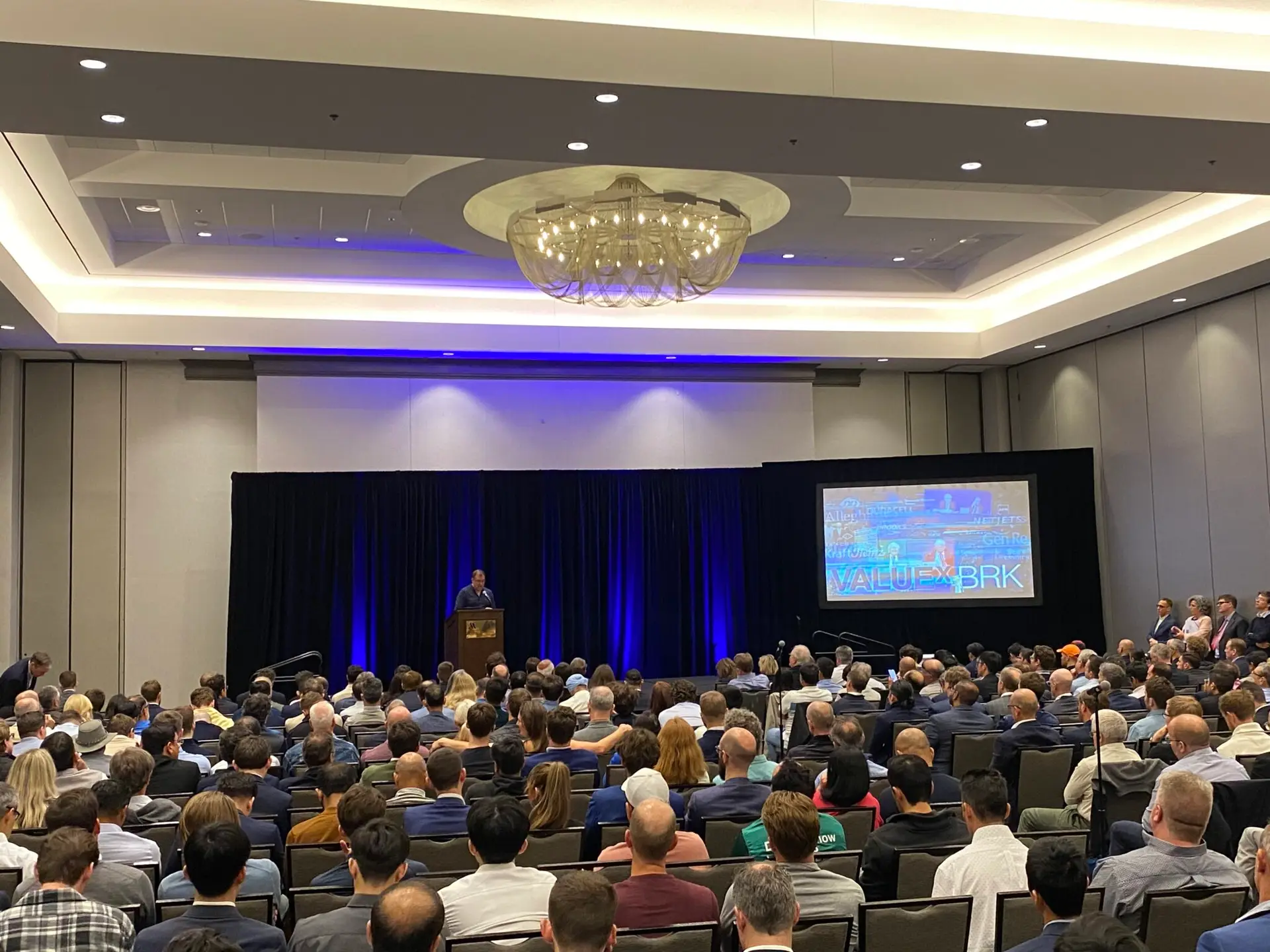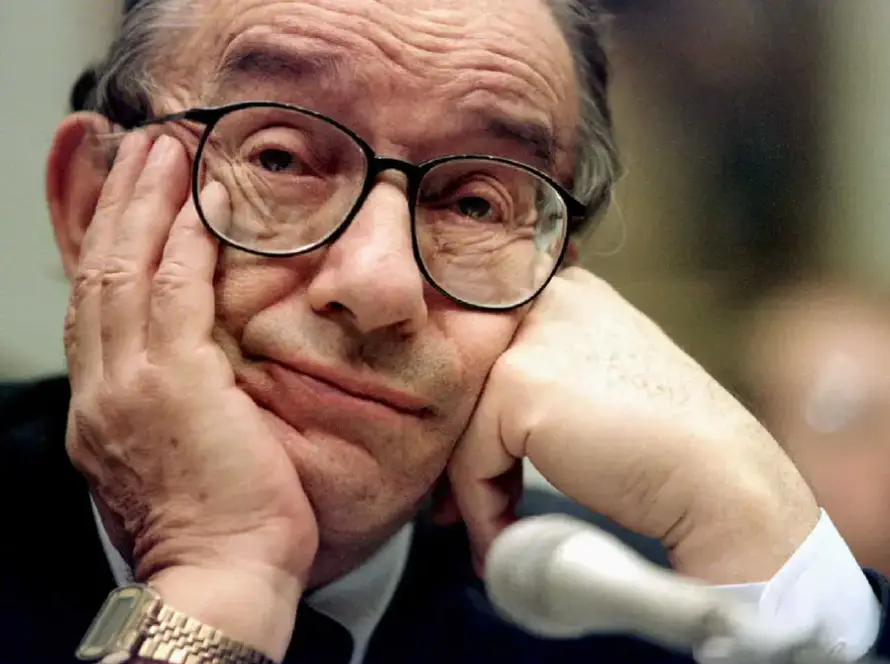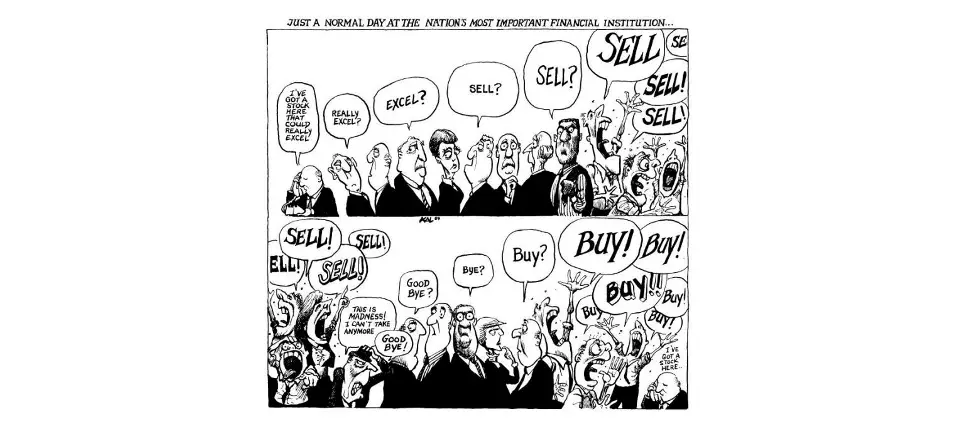Last weekend, the Berkshire Hathaway meeting took place in Omaha. This year's highlight was undoubtedly the farewell to Buffett's congenial partner Charlie Munger, who passed away last November at the age of 99. The farewell video at the beginning and the subsequent standing ovation and applause for Charlie Munger from thousands of people throughout the arena were highly emotional.
In economic terms, the meeting focussed primarily on the current market environment and Buffett's succession. Buffett emphasised that both management responsibility and capital allocation were already in the hands of the CEO and his successor Greg Abel. With Abel and his partner Ajit Jain, two exceptional experts are at the helm, particularly for the important energy and insurance segments.
On the subject of the market environment, Buffett was surprisingly direct and made no secret of the fact that the Fed is facing a major challenge with the high national debt. He talked about the fact that higher taxes were quite likely to reduce the government deficit. He also spoke highly of the then Fed chief Volker, who stuck to his high interest rate policy in the 1970s and thus tamed inflation. Bufferr believes that the high cash holdings of USD 180 billion are currently earning good interest at 5.4% - but added tellingly that he would hold on to them even if interest rates were 1%. He thus made it clear that the current valuation level does not invite investment - at least in the US large caps considered for Berkshire. The 13% reduction in the Apple investment also makes this clear.
However, it was not only the Berkshire Hathaway meeting itself that was exciting, but also the numerous events surrounding it. In particular, the ‘VALUExBRK’ event organised by Guy Spier had great participation with exciting presentations and great stories. Below is a brief summary of the individual participants. If you would like to watch the presentations, you can also find the entire event online:
VALUE x BRK: Participant overview
Moderator
Guy Spier: Guy Spier studierte in Oxford, bevor er an die Harvard Business School wechselte und im Anschluss als Investmentbanker arbeitete. Vor fast 20 Jahren gründete er den Aquamarine Fund, den er bis heute managt. 2007 ersteigerte er ein Abendessen mit Warren Buffett für 650.100 US-Dollar.
Participants
Monsoon Pabrai: Daughter of Mohnish Pabrai, who presents her investment fund and investment strategy.
William Green & Michael O’Brien: Author and photographer of The Great Minds of Investing, among other books.
Luca Dellanna: Author of a book on long-term thinking, offering valuable perspectives on success and long-term strategy.
Chris Sparling: Chris Sparling is co-founder of Tiny Capital, a company that focuses on investing in small tech companies. He and his partner Andrew Wilkinson have built close relationships with Charlie Munger and the Daily Journal. He shares experiences and insights from his meetings with Charlie Munger.
Robert G. Hagstrom: One of the best-known stock market book authors and Warren Buffett experts worldwide. The experienced portfolio manager has written numerous successful books on the subject of investment, including the million-selling bestseller ‘Warren Buffett: His Way. His method. His strategy.’
Gillian Zoe Segal: Author of the book ‘Getting there’.
Doerthe (“Dorothy”) Obert: Charlie Munger's former assistant (German, by the way), who gave insights from her 30 years of experience working closely with Munger.
Sheena Iyengar: Author who specialises in decision-making. She is known for her books ‘Think Bigger’ and ‘The Art of Choosing’. Iyengar has provided valuable insights into decision making and its importance in life and business despite her visual impairment.
Rosie Gumataotao Rios: Former Treasurer of the United States. Due to this position, her signature can be found on notes worth billions of US dollars. The experienced financial expert provides insights into the areas of finance and leadership.
Andy Slavitt: Was a key player on the ‘Obama Dream Team’ that helped implement and reform Obamacare. He was a key advisor on the US response to the Covid-19 pandemic. In doing so, he played a significant role in shaping healthcare policy in the United States. He now runs a VC fund and comments on the potential of the healthcare sector.
Paul Johnson: Johnson is a faculty member of the Heilbrunn Centre for Graham & Dodd Investing at Columbia Business School. He has also been an integral part of the CBS Value Investing Programme for over 30 years.
Mohnish Pabrai: Mohnish Pabrai is an American entrepreneur, fund manager, author and philanthropist of Indian origin.
VALUExBRK Highlights
Monsoon Pabrai, Investor
Monsoon Pabrai, daughter of Monish Pabrai, reflects on Charlie's teachings on weaving mental models and shares an investment idea inspired by Peter Lynch's approach: she looks at India's investment landscape from a consumer perspective, highlighting the growth of capital market investments and the proliferation of brokerage accounts. Pabrai introduces eight Indian companies offering fund-like products and discusses the growth potential of the Indian market in general. She also recalls a memorable meeting with Charlie Munger and Warren Buffett. She also gives advice for young women who want to enter the financial sector. In the Q&A session that followed, Monsoon Pabrai answered questions about the companies she presented, among other things. She emphasised that their quality is heavily dependent on the quality of the fund managers in the companies.

William Green & Michael O'Brien, Author and photographer
Key takeaways from the appearance of author William Green and photographer Michael O'Brien (picture of Charlie Munger):
Charlie Munger: William's experience of interviewing Charlie Munger emphasises the complexity of Munger's character. Initially intimidated by Munger's intellect, William discovered a softer, more generous side to him as the conversation progressed. William emphasises Munger's kindness and generosity, suggesting that these qualities are as important as his intellectual abilities.
Physische Umgebung und Inspiration: William suggests decorating your physical environment with images of people you admire to inspire and motivate yourself. This emphasises the importance of surrounding yourself with positive influences. Warren Buffett himself emphasised this trait. Over the years, he emphasised how important friends and life partners are for personal development. He also has a portrait of his father hanging in his office.
Luca Dellanna, Author
Key takeaways from Luca Dellanna's presentation:
Long-term game perspective: Long-term success requires moving away from day-to-day optimisation. Instead, you need to focus on building long-term values such as skills, relationships and trust. While these may not bring immediate results, they are crucial for sustained success over time.

Risk management Short-term strategies may involve taking higher risks, such as lying or cheating, which may bring immediate gains but pose significant long-term risks. It is important to understand the difference between short-term and long-term risks and to choose strategies that are consistent with long-term goals.
Iterated Games: Since many interactions and decisions are repeated over time, it is important to approach them with a focus on long-term improvements rather than short-term gains. This means not playing interactions to win immediately, but to make future interactions successful.
Invest in people: Training and developing people within an organisation are critical to long-term success. It may seem time consuming, but investing in employee development ultimately increases the long-term potential of the organisation.
Build trust and goodwill: Focus should be from actions that build trust and goodwill over time, even if they don't lead to immediate profits. These include: Supporting without expectations or nurturing relationships.
Chris Sparling, Software entrepreneur
Chris Sparling is an entrepreneur who has acquired and scaled more than 30 software companies. In his speech, he emphasised the importance of long-term thinking and the power of simplicity and trust in business. He shared a personal story of how he met Charlie Munger and his negotiations with Munger to have his company acquired by the Munger-led Daily Journal Corporation. The speech emphasised the importance of humility, self-reflection and a willingness to admit mistakes in order to truly help others. Sparling recommends being proactive in the pursuit of happiness, meaning getting out of the house and moving things forward, emphasising the value of genuine relationships in business and life in general.
Robert G. Hagstrom, Author and fund manager
In his speech, he emphasised the importance of critically questioning established paradigms and breaking new ground. Key takeaways from Robert Hagstrom's presentation:
Active management performance: Hagstrom highlighted the latest data from SPIVA, which shows that active management continues to struggle to beat the market. He expressed concern that despite the availability of better strategies, ineffective models continue to be used.
Origins of modern portfolio theory: Hagstrom reviewed the history of modern portfolio theory, tracing it back to Harry Markowitz's work. He emphasised how Markowitz's dissertation on risk and return laid the foundation for a paradigm shift in investment management, but that this should definitely be questioned.
Criticism of modern portfolio theory: Although Hagstrom recognises the contributions of modern portfolio theory, he also points out its limitations. Robert Hagstrom's criticism of modern portfolio theory (MPT) centres on the overemphasis on short-term measures such as price volatility and the neglect of the underlying economic fundamentals of companies. He argues that MPT's emphasis on diversification and volatility can neglect the quality of investments and suggests a focus on economic returns and alternative investment strategies such as value investing. Hagstrom points out the discrepancy between academic theory and practical application and argues in favour of a more holistic approach to investment management.
A plea for company-orientated investing: In response to the shortcomings of modern portfolio theory, Hagstrom proposed a new approach known as company-centred investing. This strategy prioritises economic returns over short-term performance metrics and aims to bridge the gap between the academic world and practical investment management.

Gillian Zoe Segal, Author
Gillian Zoe Segal talks about her persistence in securing an interview with Warren Buffett for her book. Despite an initial refusal, Gillian was undeterred and took an opportunity at a charity event to present her book directly to Buffett during a group photo. She promised a short interview, but ended up spending about an hour with him. Gillian's preparation, attention to detail and professionalism impressed Buffett, which led to further conversations and invitations to events. She emphasised with her story the importance of perseverance, seizing opportunities, adaptability and building relationships for success.
Doerthe (‘Dorothy’) Obert, assistant to Charlie Munger
Dorothy Obert, who was originally hired by Munger for her German efficiency and candour, reflects on her 31 years working with the legendary investor. She remembers Munger's intense concentration and self-discipline. In particular, she emphasises his ability to stay focused at work despite distractions. Dorothy's stories paint Munger as a larger than life character with anecdotes about his fondness for McDonald's Chicken Salad and his disdain for extravagant spending. Despite their differences, Dorothy and Munger built a strong working relationship based on trust, respect and mutual understanding.
Sheena Iyengar, Author
Sheena Iyengar's speech focussed on the importance of making well-informed decisions. She emphasised that it is crucial to have a clear method and tools to help you make decisions. Her goal is to understand how people can improve their decisions and how they can find meaningful solutions.
She presented a structured method in six steps to analyse problems, identify decision criteria and explore solutions, both inside and outside the industry.
The highlight of her presentation was the introduction of a new tool called Choice Mapper, which aims to revolutionise the decision-making process. This tool, which she developed with a colleague, allows users to input a problem and the groups affected and then create a map of selected options and combinations. Overall, Sheena Iyengar emphasised in her speech the importance of helping people to make better decisions.
Rosie Gumataotao Rios, 43rd Treasurer of the United States
Rosie Rios, the 43rd Treasurer of the United States. She told a compelling and multi-faceted story of her experiences in public service, her collaboration with Warren Buffett, and her current role in planning for the 250th anniversary of the United States in 2026.
An important aspect of Rios' speech was her involvement in shaping fiscal policy during the 2008 financial crisis and her subsequent service under both President Obama and President Biden. Her story emphasised the importance of the country's financial stability in turbulent times.
In addition, Rios spoke about her current role in planning for the 250th anniversary of the United States. She emphasised the importance of celebrating the nation's history while looking to the future. She explained innovative initiatives such as America's Field Trip and America's Invitation, which are aimed at getting citizens to reflect on the country's past and envision its future.
Andy Slavitt, VC investor and former head of Medicare
Andy's career path is impressive, from founding a company, to a CEO position in a large corporation, to leading major healthcare initiatives during the Obama administration.
Of particular note is Andy's pivotal role in fixing an Obama healthcare website in a matter of weeks. This success earned Slavitt Obama's recognition and eventual appointment as head of Medicare. There he oversaw the government's largest department with a $1 trillion budget.
He later moved into venture capital (VC) and founded Town Hall Ventures, which focuses on healthcare investments. He emphasises the importance of transforming care delivery and payment models to address systemic challenges in the American healthcare sector. To that end, he turned down President Biden's request to return as a government health adviser.
At the same time, Andy offers an optimistic outlook on the future of healthcare. He emphasises the potential for innovation, which will be accelerated by ever greater investment. He mentions that trillions of dollars are spent annually in the healthcare sector with the aim of shifting towards more innovative models of care. Andy believes that the key to success lies in new technologies to ensure more efficient care.
In his speech, Andy emphasises the need for a crisis mentality to drive transformative change in healthcare. Times of crisis lead to rapid adaptation and innovation. He cites the corona crisis as an example of this. Finally, Andy's career highlights the importance of empathy, collaboration and a people-centred approach to drive systemic change in healthcare.
Paul Johnson, Professor and successor to Joel Greenblatt
In his lecture, Paul Johnson deals with the task of evaluating growth in investment analysis. He draws on his experience as a professor and investor. He emphasises Buffett's consistent message that growth is an essential part of the value equation. According to Buffett, it is therefore impossible to distinguish between value and growth. However, Johnson points out the challenge of accurately valuing this growth component, especially in the context of discounted cash flow (DCF) models.
Here's a brief breakdown:
- Two-part valuation: Johnson suggests splitting the valuation problem into valuing stable cash flows and valuing growth prospects (see photo). While stable cash flows are easy to value, growth prospects are difficult due to investor expectations.
- Market-implied growth value: Using market data, Johnson shows that the market-implied value of growth has reached historic highs. This indicates increased expectations for future growth.
- Apple case study: Johnson uses the example of Apple to show how the market continues to place a high value on the company's growth potential despite stagnating profitability.
- Implications for investors: When valuing a company, investors need to understand their expectations for future growth.

In the Q&A session that follows, Johnson reflects on his journey into teaching and investing, emphasising the symbiotic relationship between theory and practice for him. He also provides insights into his collaboration with Howard Marks in creating an annotated version of ‘The Most Important Thing’, which highlights the intersection between academia and practical investment experience.
Mohnish Pabrai, Investor
Monish Pabrai shared anecdotes about his friendship with Charlie Munger and emphasised the profound influence Munger had on his life and investment philosophy - even more so than Buffett, through whom he had met Munger.
Pabrai emphasised Munger's remarkable ability to meet life's challenges with grace and positivity, even in the face of declining health. Munger's stoicism and unwavering focus on learning was palpable to the end, inspiring Pabrai and others around him.
His talk also touched on the concept of impostor syndrome, with both Pabrai and Munger acknowledging that even successful people struggle with feelings of inadequacy. Munger's jokes and humility made him a valued mentor and friend to those around him.
Overall, the discussion highlighted the profound impact Munger had on Pabrai's life and emphasised the importance of learning, resilience and gratitude. Munger's legacy continues to resonate and serve as a guide for Pabrai and countless others in their personal and professional endeavours.
Disclaimer: All information is at all times and without exception my personal opinion and judgement. No information, materials, services or other content provided on this website constitutes a solicitation, recommendation, endorsement or financial, investment or other advice. All information (forecasts, comments, hints, advice, etc.) is for educational and private entertainment purposes only. If visitors follow this advice, they act on their own responsibility.








